Extension officials in Kerala are playing a proactive role in linking farmers to markets during the current lockdown. In this field note, T Dileepkumar narrates the experience of using WhatsApp to link vegetable producers to markets.
CONTEXT
From January 2020, the Kerala State Department of Agriculture Development and Farmers’ Welfare (DADFW) initiated a programme for cultivating vegetables and fruits in all homesteads and other available cultivable areas in public and private institutions. As articulated by the Honorable Minister for Agriculture, Kerala, Adv. VS Sunil Kumar, the vision of the department was to achieve self-sufficiency in the State for safe-to-eat vegetables and fruits. This year Ernakulam district considerably increased the area and production of fruits through cluster-based targeting (Box 1) so as to meet the enhanced demand for vegetables and fruits during Easter, Vishu (an important festival of the State), and Ramzan – all falling in the months of April and May. To promote vegetable cultivation, another project was also implemented by the DADFW wherein institutions, including NGOs, were granted assistance (based on the existing rates of cost of cultivation and project guidelines) to take up vegetable cultivation in the premises of public and private institutions.
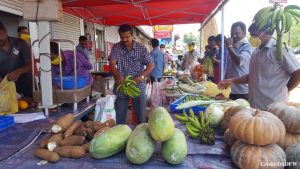 Farmer market at Kothamangalam, Ernakulam
Farmer market at Kothamangalam, Ernakulam
| Box 1. Cluster-based cultivation of vegetables
Under this scheme, a farmer group with an aggregate minimum of five hectares of land suitable for vegetable cultivation will be selected, and the group will be given financial assistance at the rate of INR 15,000 per ha as subsidy (up to a maximum of INR 75000/for five ha) for cultivation of vegetables. Additionally, the cluster members will be given need-based assistance for irrigation pump set and plant protection equipment (sprayers). The officials of the DADFW in Ernakulam district played a proactive role in promoting this scheme among farmers, and cluster-based cultivation of vegetables was initiated in most of the blocks in the district. Moreover, some of the vegetable growers were also identified for commercial cultivation of vegetables. |
Farmers as well as the common man wholeheartedly embraced the programme, and by March 2020, the foliage of vegetables was seen thriving in many homesteads and roof tops/terraces. However, when vegetables and fruits reached the harvest stage, challenges emerged in marketing these products due to the nation-wide unprecedented lockdown due to COVID-19. While some households are happy that this initiative helped them to have their own safe-to-eat vegetables harvested from their own backyards, those growing vegetables commercially found marketing these perishable commodities a great challenge.
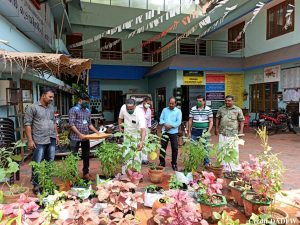 Vegetable cultivation in office frontage
Vegetable cultivation in office frontage
MARKETING HURDLES RESULTING FROM THE COVID-19 LOCKDOWN
In Ernakulam district, the farmers have adjusted their cropping cycle so that they could harvest and sell these vegetables and fruits at a good price during the festive season in April-May. The major fruit crop of the district with GI tag, the Vazhakulam pineapple, is harvested during the summer months of March-May. The main vegetables grown during this time include cowpea, cucumber, amaranth, okra, bitter gourd, ashgourd and snakegourd, etc. The lockdown devastated the expectations and hopes of the growers as they failed to harvest, transport and find markets for their produce. At the same time, the people in the urban areas faced problems arising from the unavailability of quality products for their daily use. The growers were afraid that their produce might rot and go waste due to the prevailing lockdown, which would then make them bankrupt.
Ernakulam district, located in Central Kerala, is the commercial capital of the State and includes the largest metropolitan region of the State, that is Greater Cochin. As per the 2011 Census 31.93 percent of the district’s population live in rural areas and 68.07 percent live in the urban region. This clearly shows the need for ensuring that the food supply chain stays intact in the district.
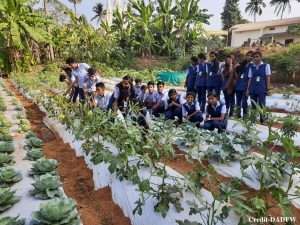 Students cultivating in schools with assistance from Krishibhavan
Students cultivating in schools with assistance from Krishibhavan
The DADFW has presence in all Gram Panchayats, Municipalities, and Corporations in the State in the form of Krishi Bhavans which are headed by an Agricultural Officer and 2-3 Agricultural Assistants. The department has already set up marketing facilities for farmers to sell their produce through Ecoshops, cluster markets, agro service centers, and farmers’ markets.
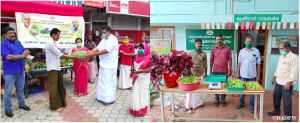 An agro service center conducing vegetable marketing inauguration by Hon. MLA, A farmer’s retail outlet operating in Krishibhavan
An agro service center conducing vegetable marketing inauguration by Hon. MLA, A farmer’s retail outlet operating in Krishibhavan
To help farmers during the lockdown, the State Government directed its officers to strengthen all the markets aided by the government and start farmers’ retail outlets in all Krishi Bhavans with minimum arrangements, so that farmers can sell their produce. As per this direction, the existing markets were strengthened and 38 new Farmers’ Retail Outlets (FRO) were set up as Jeevani Sanjeevani Markets in the Krishi Bhavan premises. Even though all the markets started functioning, product movement did not happen as expected.
MARKET INTERVENTION WITH DIGITAL EXTENSION
During the first week of lockdown, farmers could dispose their produce in the nearby areas. But as the days passed, the situation changed as farmers failed to sell their produce in the nearby areas. These problems were shared by growers through newspapers, television channels, and also through social media. In response to these constraints experienced by farmers, the Director of Agriculture instructed the department officials to intervene in the issue and explore social media options to connect farmers, traders and consumers. By that time, the Ministry of Home Affairs (Government of India) had issued orders for relaxation in lockdown guidelines with respect to transportation of farm produce and logistics connected to transport of farm inputs and outputs. Based on these guidelines, the Director of Agriculture asked the district functionaries of the department to make urgent interventions in the marketing of fruits and vegetables.
Formation of WhatsApp groups in different levels
At the district level, a crisis management WhatsApp group was then formed, comprised of the Principal Agricultural Officer, Deputy Directors, Assistant Director (Marketing), Block level Assistant Directors in the district, and two Agricultural Officers from each block.
 Whatsapp post by farmers sharing the produce ready for sale
Whatsapp post by farmers sharing the produce ready for sale
Subsequently, WhatsApp groups were formed for farmers and traders in all blocks who have more areas under vegetable cultivation, so as to notify that marketable surplus was available at the block level. The traders can directly contact the farmers and collect the produce from the farm itself in the lockdown period. At the same time, if the product is required in a residential area, the Ecoshops or agro service having vehicles can supply farm fresh products to these residential areas and apartments – on request. If the product surplus cannot be cleared within the district, the same can be shared with the groups of other districts and the produce sold in other districts, based on demand.
IMPACT
As days passed the system started showing excellent results. Formation of groups in all the blocks enhanced farmers’ access to more buyers and more markets (Table 1). Almost all farmers started to post the details of the surplus they have along with the image of the produce and their contact number, and these were shared with all other groups so as to generate orders from residential associations and traders. The trader or the consumer can directly contact the producer and take produce on mutually agreeable prices after considering the base price fixed for that day.
Table 1: Quantity sold through WhatsApp group sharing **

** Based on formal data available through Ecoshops, agro-service centres, etc. Data is not available for sales that has happened directly between the producers and traders and housing societies.
The department officials played a facilitator role while performing all their other routine work. The district level monitoring committee, having access to all the groups as well as the state level monitoring committee, can monitor the product surplus and movement within the district as well as in and outside the district as required.

T Dileepkumar, Deputy Director of Agriculture, Department of Agriculture Development and Farmers’ Welfare, Ernakulam District, Government of Kerala. (Email: tdileepkumar@ymail.com)



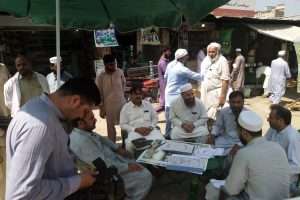

Congratulations to the staff of the DADFW, Kerala on coming out with innovative idea of linking farmers with buyers of vegetables through WhatsApp group to safeguard the interest of farmers at this critical juncture. I wish the other states can adopt similar strategies to protect the interests of both farmers and consumers of vegetables and fruits. Thanks to Mr. Dileep Kumar for sharing this useful field note.